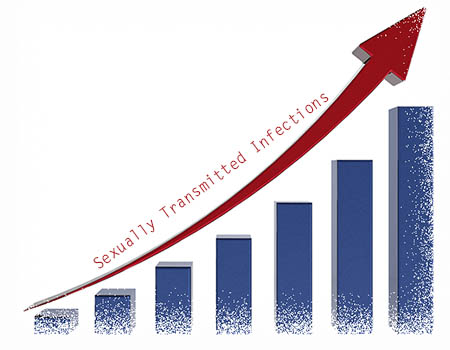 The volume of new sexually transmitted infections clinically diagnosed in Britain grows to just about 500000, (Chlamydia as well as gonorrhea fuelling the growth). The amount of STIs diagnosed grew by five per cent general, with the under 25 age group experiencing the highest rates. Medical officials warned the latest increase in the volume of medical determinations for 2012 implies that so many people are still placing themselves in danger through hazardous sex.
The volume of new sexually transmitted infections clinically diagnosed in Britain grows to just about 500000, (Chlamydia as well as gonorrhea fuelling the growth). The amount of STIs diagnosed grew by five per cent general, with the under 25 age group experiencing the highest rates. Medical officials warned the latest increase in the volume of medical determinations for 2012 implies that so many people are still placing themselves in danger through hazardous sex.
Nearly half of all infections were the problem, which grew by 46 %, based on the Public Health England. Referred to as silent infection, since it will go unnoticed for long, the problem is handed down by unguaranteed sex, and may cause pelvic inflammation related disease (PID) as well as damage the reproductive system of women if not treated. New medical diagnosis of gonorrhea grew by 21 %, which is a worry to health authorities due to new reviews of stress of the illness which is resistant against antibiotics.
Below 25 age groups brought about 64 % of Chlamydia as well as 54 percent of vaginal warts medical diagnoses in heterosexuals this year. There were additionally large improvements of STIs amongst men who have relations with men, together with a 37 percent rise in gonorrhea. And installments of STIs continued to increase in the over 45 age bracket though with a smaller margin than their youthful counterparts. As a whole, there were less than 450000 diagnoses associated with STIs made in Britain.
PHE stated this alarming rise had been due to elevated testing, and since Chlamydia medical testing at community based setups on the list of over 24s are actually contained in the numbers initially. However experts cautioned that the numbers still betray higher numbers of hazardous sexual conduct. The statement calls for much more regular STI testing and simpler use of reproductive health providers, especially high-risk groups.
These information shows so many people have hazardous sexual intercourse, thus making themselves vulnerable to STIs and the severe consequences related to infection, such as infertility. Continuing investment in applications and researches to boost reproductive health awareness, condom use and screening especially those most at risk, is vital. Medical authorities ought to proceed and incorporate Chlamydia testing into the broader spectrum of health care testing in teens which will help them maintain great reproductive health.


 Cart : 0 items - $0.00
Cart : 0 items - $0.00










